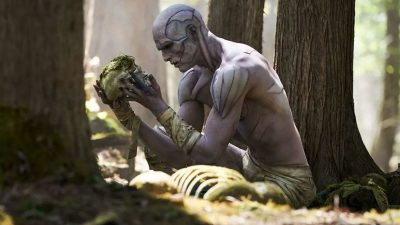What does morning serenity look like to you? Birds chirping? Fresh coffee? A warm greeting from your partner? In C’è Ancora Domani (There’s Still Tomorrow), Paola Cortellesi flips this idyllic image on its head within the opening minutes. The scene begins tenderly: hubby is up early – we see his reflection in the bedroom mirror. Our protagonist, Delia (played by Cortellesi herself) wakes up too, turns to her husband, and greets him with a radiant smile and a cheerful “Buongiorno, Ivano!” His reply? A slap across her face, which as it turns out, is part of her “daily routine”.
Set to the deceptively cheery tune of Aprite le Finestre (Open the Windows), we follow Delia as she embarks on her morning routine in post-WWII Rome’s working-class Trastevere. Breakfast sandwiches are so thin they seem like mere suggestions of food. A basement apartment where the view through the window consists of pedestrians’ legs and, on less fortunate days, a dog relieving itself. Delia gives up her food, so that her children can at least have something in the stomach. She runs around all day long, doing odd and severely underpaid jobs from fixing damaged umbrellas to patching old stockings. And yet, despite the despair etched into every corner of this existence, C’è Ancora Domani is not a straight on tragedy—it is a beautifully crafted dance (sometimes literally) between raw drama and moments of unexpected levity and warmth.

Source: Wildside
It is not every day you see a directorial debut that packs the kind of punch There’s Still Tomorrow does. Known for her comedic roles and gift for screenwriting, Paola Cortellesi steps into uncharted territory with a film that is bold, creative, old-school yet cool – in the best sense of the world. She does not just direct; she stars, co-writes, and pours her heart into the role of Delia, a mother juggling far more than anyone should. She uses ‘90s blues and today’s rock songs and juxtaposes them with pristine black-and-white, classic visuals.
How about the rest of the cast? Valerio Mastandrea plays Ivano, her abusive husband, a man whose every gesture reeks of entitlement and his excuse for everything is “I did two wars!”. Funny enough, Marsina (Emanuela Fanelli) , our leading lady’s best friend, says: “He is a jerk, and he was one even before the war”. The supporting cast, including Romana Maggiora Vergano as Delia’s modern-thinking daughter, Marcella, delivers performances that feel strikingly authentic, bringing Cortellesi’s vision to life with gut-wrenching honesty, a hint of pity and much love for her mother.
Cortellesi’s homage to Italian Neorealism is impossible to ignore here. Think Rome, Open City or Bicycle Thieves, but with a contemporary lens that sharpens its focus on issues like domestic abuse and patriarchy. Gorgeously shot in black and white by Davide Leone, the cinematography bathes the characters in chiaroscuro contrast. Leone, whose past credits include Romeo and Juliet and Black Butterfly, masterfully captures the quiet despair of post-war Trastevere, where beauty, fraternity, friendship, biting gossip and hardship coexist in every frame.
But while C’è Ancora Domani pays tribute to its cinematic forebears, it also carves out its own space. Cortellesi uses visual storytelling to highlight Delia’s subjugation without resorting to graphic depictions of abuse. Instead, she uses creative, lyrical metaphors—think: dance scenes and even the occasional pantomime.
The family dynamics in C’è Ancora Domani are as suffocating as the tiny basement apartment Delia inhabits. Three children to care for, a groping father-in-law confined to a bed in the corner, and a husband who oscillates between neglect, violence and unexpected bursts of overbearing “love”. Yet, Delia is resigned and acceptive.
But even within this grim tableau, Cortellesi finds moments of humanity and even humor. There is an absurdity to some of Delia’s struggles that feels darkly comedic, like when she fights with her husband’s father, who seems to think his fragile state entitles him to special treatment – and more! These moments of lightness, while fleeting, provide much-needed relief from the film’s heavier themes.
The film’s setting in Trastevere is more than a backdrop—it is a character in its own right. Cortellesi and Leone paint a vivid picture of life in the working-class district: laundry lines stretching across narrow alleys, the din of street vendors, the earthy smells of markets, chatty neighbors on piazzas and boiling pavement. All in all, this is not the romanticized Rome of postcards and tourist brochures. It is gritty, chaotic, and real, a place where survival often outweighs dreams.
One particularly poignant scene takes place at a family lunch with Marcella’s potential in-laws. The tension is palpable as Delia attempts to navigate the social minefield of class differences. Marcella, the family’s hope for upward mobility, is caught between her family’s dusty reality and her rich future in-laws who run a coffee shop – guess why the entire neighborhood is jealous of Marcella?

Source: Orticalab
When it comes to this refreshing-brilliant script, reportedly, Cortellesi drew inspiration from her own grandmother and great-grandmother’s experiences, grounding the film in personal history. This authenticity seeps into every frame, making Delia’s struggles feel both specific and universal. But while the film is steeped in the socio-political context of post-war Italy, its themes resonate far beyond that time and place.
Domestic abuse, gender inequality, and societal patriarchy are not relics of the past—unfortunately, they are issues we are still grappling with today. In fact, the film’s success in Italy, where it outperformed blockbusters like Barbie and Oppenheimer in 2023, speaks to its contemporary relevance, and to the power of storytelling with heart and humor.
What sets C’è Ancora Domani apart is not just its artistic merit—it is the impact it has had beyond the screen. Cortellesi and her team partnered with charitable organizations, donating a portion of every purchased theatre ticket to causes aligned with its themes.
At its core, this is a story of resilience. Delia’s journey toward empowerment is as inspiring as it is heartbreaking, a reminder that even in the darkest of times, there is still tomorrow if we are not too afraid to see it and take it.
There’s Still Tomorrow is available on Apple TV, and if you are lucky, you may also catch it at your local movie theatre. It is getting a wider, international release these days.
~ by Dora Endre ~
























